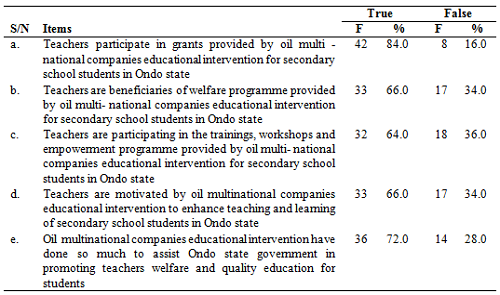
Influence of Oil-Multinational Companies Educational Intervention on Quality Delivery of Education for Secondary Schools in Ondo State, Nigeria
Abstract
This study adopted descriptive study, four research questions were formulated and one hypothesis was postulated. Ten schools were purposively sampled, in each school ten students and five teachers were randomly selected making one hundred and fifty respondents. The findings of the study showed that 76.0% and 11.0% of the students described as very true and true. The Oil multi-national companies’ educational intervention contributes to the quality delivery of education for students in Ondo State secondary schools with the score of 8.0% and 5.0% of students also indicated untrue and very untrue. The findings showed that, 65.0% and 25.0% of the students described as very strong and strong that students are participating in the opportunities provided by oil multi- national companies for secondary schools in Ondo state while 4.0% and 6.0% described as poor and very poor. This study gave the following recommendations: Government should show a great concern towards the educational wellbeing of students as this would foster sponsors to support the government in educating students, Secondary school management should ensure a proper platform not necessarily an online platform for the awareness of opportunities provided by oil multinational companies to secondary schools to aid quality delivery of western education.
Keywords
Full Text:
PDFReferences
Ajayi I. A. (2002). Resource factors as correlates of secondary school effectiveness in Ekiti State. Nigeria Journal on Counseling Applied Psychology 1(1). 109-115.
Akinfolarin A.V. (2017). Comparative study of staff welfare administration in public and private secondary schools in Akoko North West local government area of Ondo State. Paper Presented at the2017Annual National Conference of the Faculty of Education, Nnamdi Azikiwe University, Awka.
Bawalla O. G. & Nafiu F.Y. (2018). Reward System and Public Secondary School Teachers’ Performance. Covenant Journal of Business& Social Sciences (CJBSS) 9(1).
Biodun, A. (2004). The Impact of Oil on Nigeria’s Economic Policy Formulation. A paper presented at the conference on Nigeria: Maximizing Pro-poor Growth: Regenerating the Socio-economic Database by Overseas Development Institute in collaboration with the Nigerian Economic Summit Group.
George I. (2017). History of western education retrieved on 15th December 2013.
Gilberthorpe, E, Banks, G. (2012). Development on whose terms? CSR discourse and social realities in Papua New Guinea's extractive industries sector. 185-193.
Jayeola-Omoyeni, M.S. & Omoyeni, J.O. (2014). Contributions of western education to the making of modern Nigeria during and after the First World War; European Scientific Journal 10(31).
Ike, P. (2017). Problems and Prospects of Secondary Education in Nigeria. International Journal of Education and Evaluation. 3(1). 44.
Ikoya, P.O. & Onoyase, D. (2008). Universal Basic Education in Nigeria: Availability of Infrastructures for Effective Programme Implementation. Educational Studies.
Ismail, B., Muhammmad, F.O., & Mohd, D.K. (2017). Multinational corporations and Nigeria’s education development: an international development perspective: International Journal of Management Research & Review 7.
Omoregie N, (2005): Re-packaging secondary education in Nigeria for great and dynamic economy. Paper presented at the 2nd Annual National Conference of Association for Encouraging Qualitative Education in Nigeria (ASSEQEN). 9th-11th May.
Owoeye. J.S. (2009). The effect of interaction of location, facilities and class size on academic achievement of secondary school students in Ekiti State, Nigeria. Unpublished Doctoral Thesis, University of Ibadan, Ibadan.
Uthman S. L & Mohammed A.Y. (2018). Quality assurance practice and instructional delivery among Secondary School civic education teachers in Kaduna state, Nigeria. British Journal of Education, 6(3). 41-56.
WES Staff. (2017). Education in Nigeria. Retrieved 2nd February 2020.
DOI: http://dx.doi.org/10.31258/jes.6.3.p.498-510
Refbacks
- There are currently no refbacks.
Copyright (c) 2022 Abdulaziz - Isiaka

This work is licensed under a Creative Commons Attribution 4.0 International License.
Publisher: FKIP Universitas Riau












